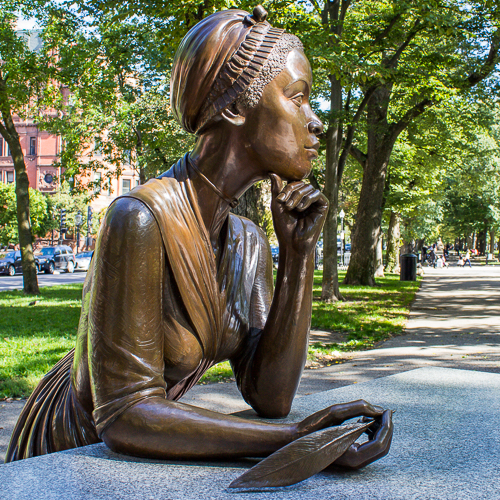February is African American History Month paying tribute to the generations of African Americans who struggled with adversity to achieve full citizenship in American Society. Within the three parks cared for by the Friends, there are two important sculptures memorializing Boston African Americans.
Boston Common is home to the Robert Gould Shaw and Massachusetts 54th Regiment Memorial, a bas-relief masterpiece commemorating Colonel Robert Gould Shaw leading the Massachusetts 54th Regiment, the first all-volunteer black regiment in the Union Army.
Commonwealth Avenue Mall’s Boston Women’s Memorial honors Phillis Wheatley as one of three important women from Boston. Phillis Wheatley was the first African American, the first slave, and the third woman in the United States to publish a book of poems.
The Robert Gould Shaw and Massachusetts 54th Regiment Memorial

The most acclaimed piece of sculpture on Boston Common is the Robert Gould Shaw and Massachusetts 54th Regiment Memorial by Augustus Saint-Gaudens; a memorial to that group of men who were among the first African Americans to fight in the Civil War.
The monument portrays Shaw and his men marching down Beacon Street past the State House on May 28, 1863 as they left Boston on their way to South Carolina, Shaw erect on his horse, the men marching alongside.
Augustus Saint-Gaudens took nearly fourteen years to complete this high-relief bronze monument, which celebrates the valor and sacrifices of the Massachusetts 54th. Saint-Gaudens was one of the premier artists of his day; he grew up in New York and Boston, and trained in Paris. The monument was paid for by private donations and was unveiled in a ceremony on May 31, 1897. The Shaw Memorial remains one of sculptor Augustus Saint-Gaudens’ most stirring and celebrated masterpieces and is considered by some to be America’s greatest public monument. The Friends of the Public Garden raised funds to restore and endow the monument, which was rededicated in 1997.
According to the National Park Service:
“The Massachusetts 54th Regiment became famous and solidified their place in history following the attack on Fort Wagner, South Carolina on July 18, 1863. At least 74 enlisted men and 3 officers were killed in that battle, and scores more were wounded. Colonel Shaw was one of those killed. Sergeant William H. Carney, who was severely injured in the battle, saved the regiment’s flag from being captured. He was the first African American to be awarded the Congressional Medal of Honor. The 54th Regiment also fought in an engagement on James Island, the Battle of Olustee, and at Honey Hill, South Carolina before their return to Boston in September 1865. Only 598 of the original 1,007 men who enlisted were there to take part in the final ceremonies on the Boston Common. In the last two years of the war, it is estimated that over 180,000 African Americans served in the Union forces and were instrumental to the Union’s victory.”
Phillis Wheatley
The statue of Phillis Wheatley is one of three women subjects of the Boston Women’s Memorial on Commonwealth Avenue Mall between Fairfield Street and Gloucester Street. As described in the dedication program from 2003, “These three women share a strong sense of Boston identity, a place in national history, a passion for social justice and the ability to inspire and impact people.”

Phillis Wheatley was the first African American, the first enslaved person, and the third woman in the United States to publish a book of poems. She was born in Senegal in 1753, kidnapped at eight years old, brought to Boston on a slave ship and purchased by John Wheatley as a personal servant for his wife. Her intelligence was noticed immediately and she was encouraged to study theology, and the English, Latin and Greek classics. She wrote her first published poem at age 13, modeling her work on the famous English poets of the time, John Milton, Thomas Gray, and Alexander Pope. Six years later she published a book, Poems on Various Subjects, Religious and Moral achieving international distinction with George Washington and Voltaire both recognizing her talent. The book includes Christian elegies, as well as poems dealing with race, such as “On Being Brought from Africa to America.”
Wheatley’s doctor suggested that a sea voyage might improve her delicate health, so in 1771 she accompanied Nathaniel Wheatley on a trip to London. She was well received in London and wrote to a friend of the “unexpected and unmerited civility and complaisance with which I was treated by all.” Always in fragile health, she died before she was able to secure a publisher for a second volume of poems and letters. Her final manuscript was never found.

